Interview with Randy Schrager – Scissor Sisters
Randy Schrager is the New York drummer who takes to the stage
as ‘Randy Real’ with the Scissor Sisters. The band have been promoting
the latest album, ‘Magic Hour’, across the globe since April 2012 and
have just played two sold out shows at The Roundhouse in London, which
is where I met up with Randy to talk about Rototoms, playing with a
click, supporting Lady Gaga on her USA arena tour and what life is like
on the road.
Tell me how you started drumming
I had a few toy drums around the house and would always bang on them
or pick up a mallet and start playing. My first instrument was piano,
which I started at five years old. A friend of my older brother had a
drum set that I saw set up in his bedroom and I started playing on that
one day. That was what made me realise, ‘Oh wow, you can actually play
more than just one drum at a time!’. I was probably seven or eight when
that happened and then at nine years old you get to choose an instrument
at school in the States. There were no guitar or piano lessons in
school, so I picked the drums rather than a horn or woodwind or anything
like that. I feel like I was definitely drawn to it though.
So you had lessons at school?
Yes. My first lessons were great. It was all on the pad, all about
the snare drum learning singles, doubles and paradiddles. I learnt how
to read music, which I knew a bit from playing piano. Then I started
private lessons the following year and I got a drum set.
Did you take it on to college?
Yeah I did. I went to music school; I went to the University of
Miami, which is a great school in Florida. I studied with amazing
teachers down there and was around a lot of great players. Throughout
all of my schooling, there were after-school programs of music; school
bands, orchestra and rock bands in high school and then, of course, tons
of studying and playing in college. I didn’t want to go to college at
first but my folks wanted me to. I wasn’t even aware that music schools
existed until my music teachers told me about places to study. I’m glad I
went because it totally helped shape who I am as a musician.
When I went to school in Miami I realised that I definitely wanted to get back to New York, which is where I’m from. Some of the people I met in school had already come back up to New York and the first thing I did was call people up to say I’d graduated. There was the working musician side where I would get the network going. There was also coming back and just hanging out and playing with my high school friends, the more ''garage'' aspect of my musical upbringing; nothing to do with becoming a working musician, just playing. I came back and I started gigging in theatres and with big bands; all the ‘legitimate’ stuff but I was also playing in bands in bars and clubs in New York. I knew I wanted to be in a band. I tried to make that happen. How did you join Scissor Sisters? I was playing in a club in the East Village in NYC and the keyboard player for Scissors at the time, John Garden, happened to see me play. We struck up a friendship and he really liked the music; I was playing with a singer songwriter and John really dug his stuff and he happened to be back in town six months later when we were playing at the same place. It was then that he told me he played keyboards with Scissor Sisters and that they were playing the next night. I said, ‘I’ve totally heard of Scissor Sisters’. I’d seen them play on ‘Saturday Night Live’ a year or so before that so I went to check out the gig. Then a couple of months later he called me up and said their drummer had thrown his back out. They wondered if I’d like to come and audition. He said they’d need me for about two weeks and it would involve going to Japan and doing some promo. This was in the early days of touring their second record, ‘Ta-Dah!’, in the Fall of 2006. I got flown from New York to Chicago where the tour had stopped and auditioned along with a couple of other guys. I got the job and didn’t go home for about three weeks. Later in 2007 their drummer had to leave again so I came back in as a sub and finished the album campaign over about four or five months. In 2009, when it came time to make the third record, they had parted ways with their drummer in the down time. So they called me back and I became the touring/recording drummer for the group. |
It was a fun tour! It was good for Scissor Sisters because it exposed them to many more people in the States. We were playing big arenas over there, which we’d never done in the States, only in the UK. We also had our own shows sprinkled throughout that tour because opening up for her we only played for 26 minutes a night and with no sound check, usually because her dancers would be on stage working stuff out. It was a lot of fun playing the huge venues back home and the crazy fan base but as far as playing-wise I did barely any work on that tour! We got to play Madison Square Garden two nights in a row…I took the subway from my apartment to the gig so that was awesome! Her band is amazing and her drummer, Spanky, was really cool. Moving on to the latest album ‘Magic Hour’, were you involved much in the writing and recording process? I was involved more on the previous record ‘Night Work’ but not so much on ‘Magic Hour’. They made this record with quite a few different producers and there are no live drums on the record at all. It’s very pop, it’s all ''in the box'' and programmed. I did record certain songs cos when Scissors go in to the studio to prepare for the record they have a whole batch of stuff. I did one day in the studio and none of that made the final cut; not because of my playing but because those songs didn’t fit in well with what they were going for on this record. So my involvement with ‘Magic Hour’ really started in rehearsals. With ‘Night Work’ I already knew the songs and knew what I was going to play before going into rehearsals for the tour. With ‘Magic Hour’ I hadn’t heard most of it. I wound up getting the multitracks and putting them into Pro Tools to hear the various parts going on. I then came up with my live parts based off of what I was hearing. What’s your set up? I play DW drums, Zildjian cymbals, Evans heads and Vic Firth sticks. I have a 6-piece kit with some extras; it’s basically a five-piece with two racks and a floor, snare, kick but I added a left side floor tom. I also have three Rototoms set up, a Roland SPD-S module, and a Roland PD-8 pad. I have triggers on the kick and the snare; the kick trigger is always layered in there with the acoustic kick. The snare trigger depends on what song is going on. |
An hour before the show I take the sticks and the pad and I pretty much do the same thing every night, which is the Alan Dawson Rudimental Ritual; it’s great! I only have the first four pages memorised so I do up to that and then I do some singles and buzz rolls to get the little muscles going. I usually repeat that a few times. After the hands are good I warm up by stretching, doing jumping jacks and some jogging in place because I’ve had some injuries as a result of not being completely warmed up. If I was doing a jazz gig it would be more about the hands and less about a full body warm up, but this is pretty lively. Before that I eat dinner and the show is such a loud hour and a half that I need the rest of the day to be nice and relaxed. I try and have as much of a normal day as if I’m at home. My ideal is reading, surfing the internet, talking on the phone. I’ll do a little sightseeing if time allows…it keeps me inspired. Apart from your warm up do you do any working out? I’ve been running a lot recently. I’m not really an outdoor runner because its tougher on my knees but I’ll hit a treadmill if there’s a gym in a hotel. I’ll also do some exercises in my hotel room that I don’t need a gym for. I’m better these days at staying in shape than I used to be! What about after the show? Something that has really helped me, and I think most drummers would benefit from this after playing really hard for a long time, is drinking a recovery shake after the show, which is like what you’d do after going to the gym. Basically, protein powder and water. Before I started drinking those I would be sore for days. Now it’s the first thing I do when I come off stage, then I drink water…and then I start drinking wine! But the shake really helps with recovery and I find that I rarely have to ice my hands or arms as a result of drinking them and I’m never sore. Then I try and rest my ears and get on with whatever else I was doing before the show. |
We started doing the promo for this record in April so I get home November 2nd (2012) and we might have a few dates in Mexico in December but that’s it really. It’s hiatus time again as these last two records have been back to back. We’ve been touring with some short breaks since February 2010 so everyone wants some extended time off from the band. But for me that means no break; I’ll get back home and get back to work. What are your plans? My main plan is to get creative and make some music with some friends back in NYC, just do some playing and see what happens. Also at the beginning of this tour I started making calls to some producers I know to let them know I’ll be home and anybody coming in to record, if they need anybody, give me a shout. I play with people in NY who don’t tour a lot, they just gig around there. There were a few recordings I was working on in the middle of being home and going on tour so I’ll resume some of those things. I’m definitely looking forward to being at home for a bit but I’m not against going back out on the road if the right opportunity presents itself. I really need to get back to the practice room cos I don’t play enough on tour! I lose a lot of the stuff I’ve worked on that makes playing this gig easier. So when I get home I’ll get right back in. I can’t wait to get back and practise. What do you work on? I go straight to the co-ordination independence stuff because doing this gig, most of the songs are four on the floor so I need to get back my independence. I also try and play music on the drums and improvise; all the things that don’t get enough attention on this kind of gig. |
This whole gig is on a click and there’s also backing tracks, whether they be electronic loops or keyboard parts that can’t be covered by everybody, or just production aspects of the record that the band wants to hear on stage. I use in-ear monitors. I have a monitor mix of the music and then I have independent control over the click track. I try and tuck the click track in a nice sonic spot of the mix; I find if the click is too loud my feel goes out the window. On certain songs, depending on what’s coming off track, if there’s a really rigid 16th note loop I have to be right on it. Some songs are more forgiving and I can float around the time a bit more and be a bit looser. Playing dance music it’s important to know what your boundaries are. You can’t float too much but a little bit of wiggle room is great sometimes! You were saying that you have a drum tech on this tour but you tune your own drums every night Yeah, I prefer to tune the drums myself. I like a real warm sound; I put coated heads on the top and the bottom, double ply on the top. The front of house engineer and I work together as far as the drum sounds; he’s the genius in making them pop and having them really clear out front. I tune to the same notes every day, even if we’re renting a drum set. I have an app on my iPhone and I tune to the same notes. I pretty much tune everything in 4ths. Things sit pretty well there with the size of the drums. It helps him because he’s able to frequency gate the drums so if I hit the 2nd rack tom you will only hear that through it’s individual mic because the other mics aren’t picking it up as he’s gating out the other frequencies. Every time I hit a tom they will come out crystal clear. He was really psyched about that! The DWs are so consistent that even if the depths are a little different on a rental kit, if the diameters are the same I can usually bring them to the same spot. |
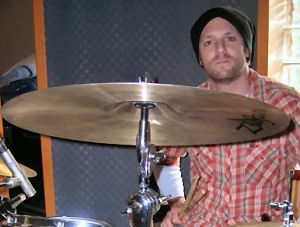 |
How long have you been with DW?
I’ve been an official DW artist since the beginning of the ‘Night Work’ campaign, so about three years.
Have you always tuned to specific notes or is that only on the DWs?
I always tuned in intervals but I never thought it was necessary to
get specific notes until I got a smartphone! I realised I could dial it
in the same every night, which really helps. If you have the note for
one drum and you know intervals then that’s all you need. The DW''s are
pretty easy to dial in where you want.
What tracks do you use the Rototoms on?
I have a small solo spot during the show; on the last tour it was
more of a feature but since we’re on a different record it’s a bit less
this time. We gate them out Phil Collins/Nick Mason style and it’s on
the song ‘Invisible Light’. I use them as a fill into each chorus but I
get to dig into them on that eight bar solo. On other songs I often
throw them in leading into a snare hit, same as with the left side floor
tom. Other songs on ‘Night Work’ were recorded with the Rotos too, so
that’s why they made it into my setup initially. There’s a track off the
new record called ‘Let’s Have a Kiki’. When Scissors do that song on
television I’m not there; they do it to a track. But live I get to
basically solo over it and the Rotos come in handy on that.
This is the only gig I do with Rototoms but I think I want to do
every gig with them now! I was using only two earlier in the tour to
bring things in a little closer but I missed the range so I brought the
little guy back. I find that Rotos are a great way to add melodic range
to your setup and they don’t take up as much space as full size drum
shells would; and they cover the sound just as well and maybe even with
more bite.
My job here is to bring the songs to the stage. I try and take it a
step up from where the record is and make it exciting. If that means
changing the part a bit or making it seem more live, that’s what I do.
Interview by Gemma Hill
-------------------------------------------------------------
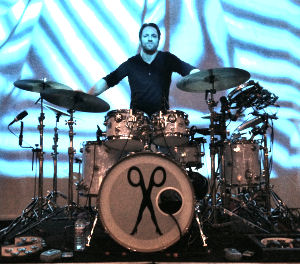
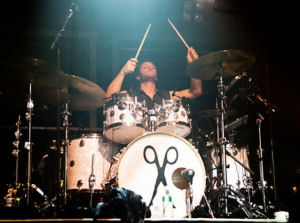
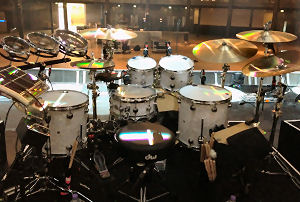
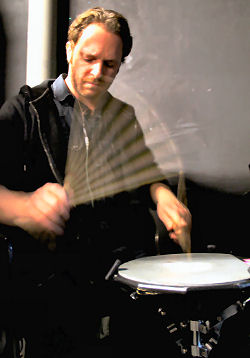
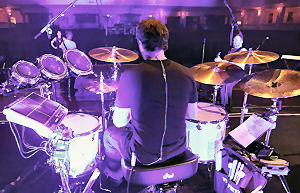
Sem comentários:
Enviar um comentário